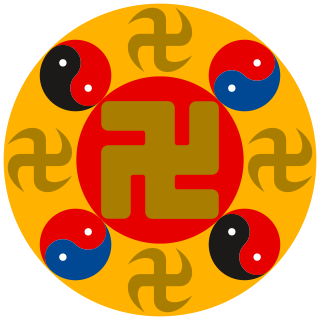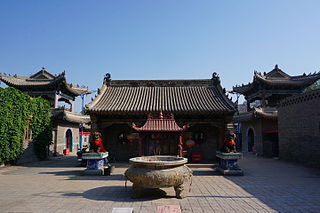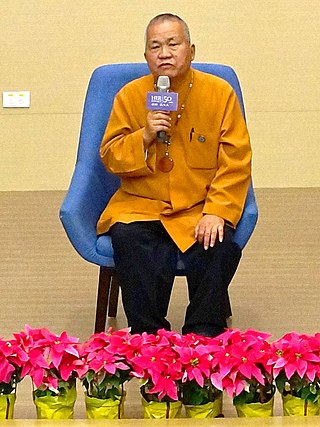
Falun Gong or Falun Dafa is a new religious movement. Falun Gong was founded by its leader Li Hongzhi in China in the early 1990s. Falun Gong has its global headquarters in Dragon Springs, a 427-acre (1.73 km2) compound in Deerpark, New York, United States, near the residence of Li Hongzhi.

Chinese folk religion, also known as Chinese popular religion, comprehends a range of traditional religious practices of Han Chinese, including the Chinese diaspora. Vivienne Wee described it as "an empty bowl, which can variously be filled with the contents of institutionalised religions such as Buddhism, Taoism, Confucianism and Chinese syncretic religions". This includes the veneration of shen (spirits) and ancestors. Worship is devoted to deities and immortals, who can be deities of places or natural phenomena, of human behaviour, or founders of family lineages. Stories of these gods are collected into the body of Chinese mythology. By the Song dynasty (960–1279), these practices had been blended with Buddhist, Confucian, and Taoist teachings to form the popular religious system which has lasted in many ways until the present day. The present day government of mainland China, like the imperial dynasties, tolerates popular religious organizations if they bolster social stability but suppresses or persecutes those that they fear would undermine it.

Haneunim or Hanunim is the sky God of Cheondoism and Jeungsanism. In the more Buddhist-aligned parts of these religions, he is identified with Indra. In the more Taoist-aligned parts of these religions, he is also known as Okhwang Sangje and under that name, he is a deity in the Poncheongyo religion.
In the Chinese common religion and philosophical schools the idea of the universal God has been expressed in a variety of names and representations, most notably as 天 and 上帝.

Yiguandao / I-Kuan Tao (traditional Chinese: 一貫道; simplified Chinese: 一贯道; pinyin: Yīguàn Dào; Wade–Giles: I1-Kuan4 Tao4), meaning the Consistent Way or Persistent Way, is a Chinese salvationist religious sect that emerged in the late 19th century, in Shandong, to become China's most important redemptive society in the 1930s and 1940s, especially during the Japanese invasion. In the 1930s Yiguandao spread rapidly throughout China led by Zhang Tianran, who is the eighteenth patriarch of the Latter Far East Tao Lineage, and Sun Suzhen, the first matriarch of the Lineage.
The Xiantiandao, also simply Tiandao is one of the most productive currents of Chinese folk religious sects such as the White Lotus Sect, characterised by representing the principle of divinity as feminine and by a concern for salvation of mankind.

Shengdao, best known by its corporate name Tongshanshe is a Confucian salvation sect part of the Xiantiandao lineage.
Li Hongzhi published the Teachings of Falun Gong in Changchun, China in 1992. They cover a wide range of topics ranging from spiritual, scientific and moral to metaphysical.

Religion in Taiwan is characterised by a diversity of religious beliefs and practices, predominantly those pertaining to the continued preservation of the ancient Chinese culture and religion. Freedom of religion is inscribed in the constitution of the Republic of China (Taiwan). The majority of Taiwanese people practice a combination of Buddhism and Taoism often with a Confucian worldview, which is collectively termed as Chinese folk religion.

The sky often has important religious significance. Many religions, both polytheistic and monotheistic, have deities associated with the sky.

Xuanyuandao, also known as Xuanyuanism (軒轅教) or Huangdiism (黄帝教), is a Confucian folk religion of China which was founded in Taipei, Taiwan, in 1952. The founder was Wang Hansheng (王寒生) (1899–1989), a legislator. The Church of Xuanyuan aims to restore the "national religion" of archaic China, with Huangdi as the universal God.
Chinese salvationist religions or Chinese folk religious sects are a Chinese religious tradition characterised by a concern for salvation of the person and the society. They are distinguished by egalitarianism, a founding charismatic person often informed by a divine revelation, a specific theology written in holy texts, a millenarian eschatology and a voluntary path of salvation, an embodied experience of the numinous through healing and self-cultivation, and an expansive orientation through evangelism and philanthropy.

Northeast China folk religion is the variety of Chinese folk religion of northeast China, characterised by distinctive cults original to Hebei and Shandong, transplanted and adapted by the Han Chinese settlers of Liaoning, Jilin and Heilongjiang since the Qing dynasty. It is characterised by terminology, deities and practices that are different from those of central and southern Chinese folk religion. Many of these patterns derive from the interaction of Han religion with Manchu shamanism.
The Way of the Gods according to the Confucian Tradition, also called the Luandao or Luanism or—from the name of its cell congregations—the phoenix halls or phoenix churches, is a Confucian congregational religious movement of the Chinese traditional beliefs.

Shanrendao is a Confucian-Taoist religious movement in northeast China. Its name as a social body is the Universal Church of the Way and its Virtue or simply the Church of the Way and its Virtue, which is frequently translated as the Morality Church. Shanrendao can be viewed as one of the best examples of the jiaohua movements.

The predominant religions in Northeast China are Chinese folk religions led by local shamans. Taoism and Chinese Buddhism were never well established in this region of recent Han Chinese settlement. For this reason the region has been a hotbed for folk religious and Confucian churches, which provide a structure, clergy, scriptures and ritual to the local communities. The Way of the Return to the One, the Universal Church of the Way and its Virtue (Shanrendao), and more recently the Falun Gong, have been the most successful sects in Manchuria, claiming millions of followers. Schools of Tibetan Buddhism, traditionally transmitted by the region's Mongol minorities, have made inroads also among Han Chinese.

The Holy Dragon Flower Church of the Heart-bound Heavenly Way, also known simply as Yixin Tiandao, Yizhendao or the Holy Church of the One Truth, or Changmaodao, is a Chinese folk religious sect part of the Xiantiandao tradition.
Weixinism, institutionally also known by the extended title of Holy Church of the Heart-Only is one of the Chinese salvationist religions born in Taiwan in the late 20th century. It was founded in 1984 in Taichung by Grand Master Hun Yuan. Its global core membership is about 300,000, with a larger audience estimated by Taiwan's Ministry of Internal Affairs at 1,000,000. The church has quickly spread to mainland China since the early 2000s, where it functions as a platform for joint initiatives of the Chinese mainland and Taiwanese governments for the renewal of Chinese culture. It has also developed as a worldwide religious movement, attracting followers not only from the Chinese diaspora, but also communities of other races, including East Asians and even Westerners.

Chang Yi-Jui, later known as Grand Master Hun Yuan, is the founder of Weixinism, also known as Weixin Shengjiao, a Taiwanese new religious movement. He is also the author of several books on I Ching and Feng Shui and a painter.
The Four Heavenly Ministers , also translated as the Four Sovereigns, are four of the highest sky deities of Daoism and subordinate only to the Three Pure Ones. They assist the Three Pure Ones in administering all phenomenon of the universe.
















